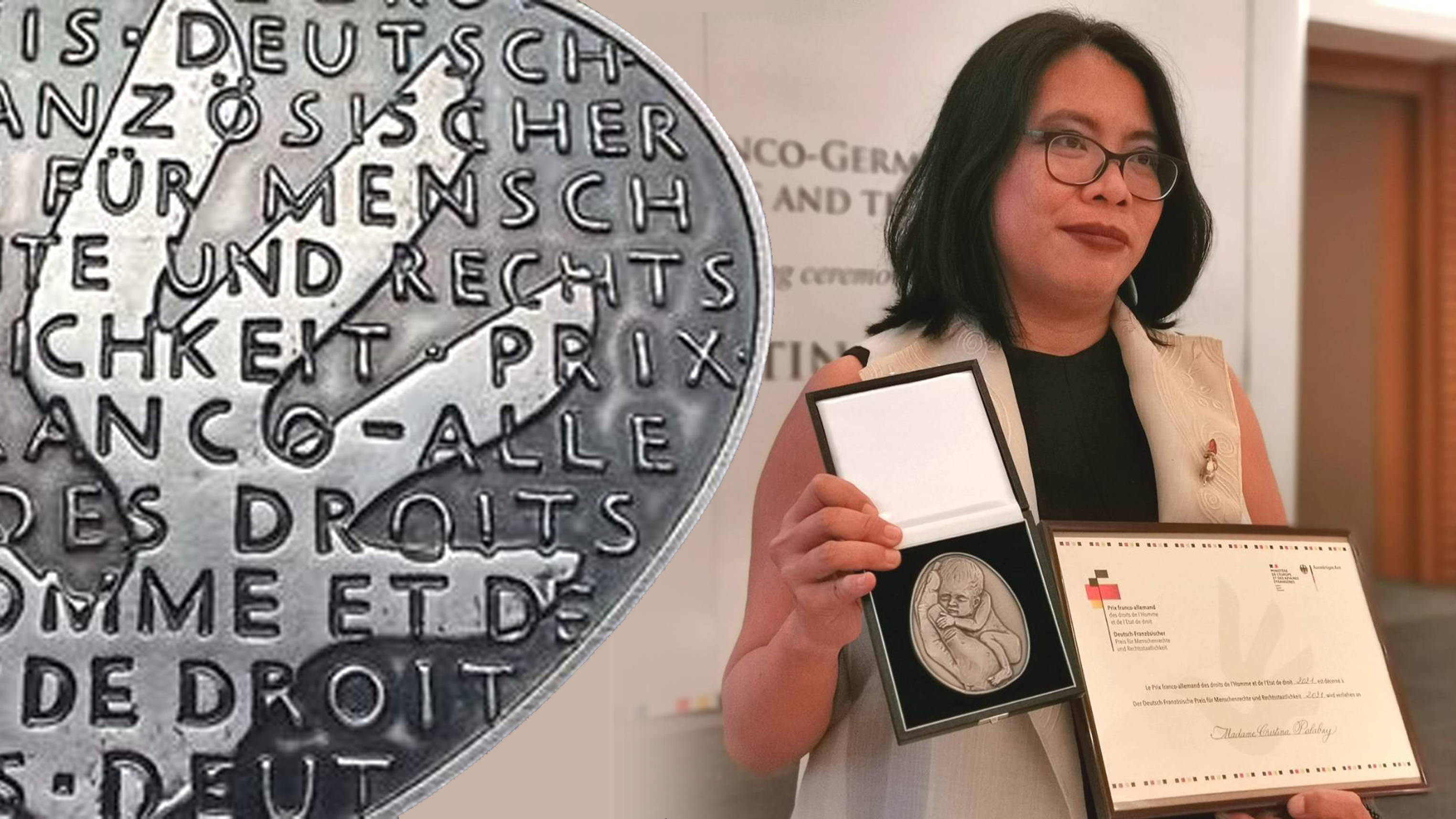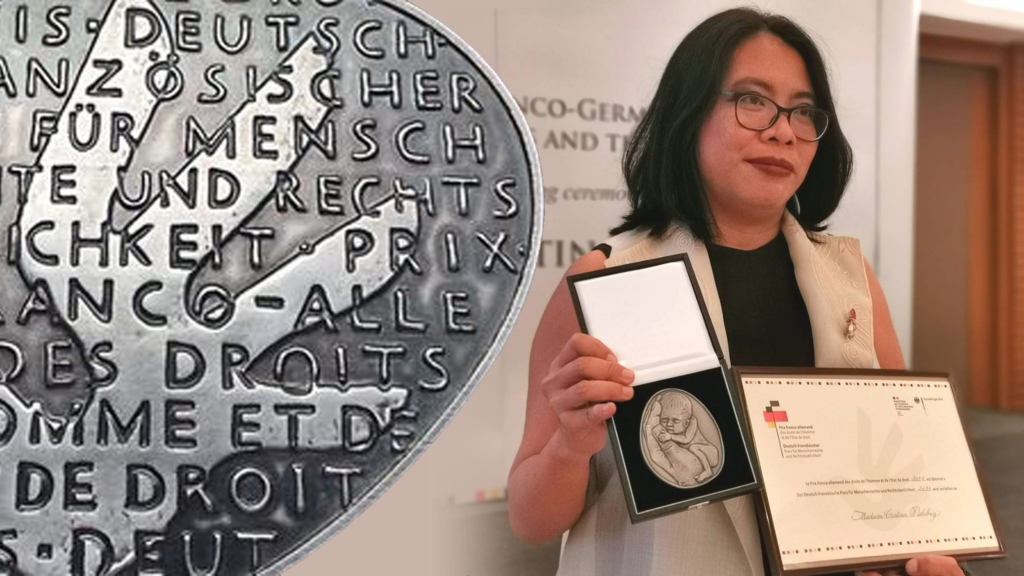
Your Excellencies, esteemed colleagues at the UN, kindred spirits among journalists, my dear colleagues in civil society and the human rights community. Magandang gabi po, good evening.

Your Excellencies, esteemed colleagues at the UN, kindred spirits among journalists, my dear colleagues in civil society and the human rights community. Magandang gabi po, good evening.
I, and many human rights defenders like me, have been asked many times: “What keeps you going despite everything — the death and rape threats, judicial harassment, the red-tagging, disinformation, and vilification, and other rights violations?” I always go back to that time when as a freshman student at the University of the Philippines: I had my eureka moment and I had decided right there and then that I cannot simply unsee the things that make our world a bleak one, that I had to do something, and that I have to keep on going.
Together with some fellow students, we were then going every weekend to a picket line of striking workers, talking with them on why they are on strike, why they had such pittance for wages despite more than 8 hours of work and overtime. I marveled at their clockwork discipline and unity as they took turns in cooking, discussing with wide-eyed teenagers like us, cleaning and guarding the picket line, negotiating with the private guards, the police, and their employers. And then, weeks after, I was shocked to learn that their leader was shot dead near the picket line.
It was simply an unacceptable killing of a trade union leader with conviction for the workers. At that moment, I told myself: no way, I cannot just go on like it’s business as usual, get married, and live a life of apathy, after seeing that those who are the lifeblood of our nation — the workers — get treated like that.
Little did I know that many years after, I’d have to witness such daily fare of violence as a women’s rights activist and as a human rights worker of Karapatan, staring at and being in the eye of fascism and authoritarianism. But perhaps, more than being a witness to such pains and violence, I am inspired by the strength of those who had it worst.
I met the mothers of desaparecidos Sherlyn Cadapan and Karen Empeño, and Mrs. Edita Burgos, mother of the missing Jonas. I heard their impassioned words on their journey finding their loved ones, how painful it was to be met with denials from authorities despite numerous leads on the perpetrators. I witnessed how their journey fortified their resolve and be human rights defenders themselves. I hear and feel that now with Johanna Abua, wife of missing peasant organizer Steve Abua, who pleas to everyone to help her find her husband and all disappeared.
I recall how our paralegals reported on the raids and arrests in October 2019, and how a mother, women’s rights activist Cora Agovida, was painfully separated from her baby and ten-year old child because of trumped-up charges. Thankfully, because of her unflinching resolve for truth and justice, Cora has been recently released from prison and she is with us today. Cora was supported by a group of families of political prisoners called Kapatid, and its members are with us also tonight. Many more remain in prison, more than 700, for their political beliefs and activism, and Kapatid has remained steadfast in the call for their just and humanitarian release and the dismissal of the fabricated charges against them.
I see and feel the fire, the unquenchable thirst for justice, in the eyes of labor freedom of expression advocate Lean Porquia and Evangeline Hernandez. Both of them are here today. Lean’s father was killed last year in Iloilo, after he received threats and worked to help those affected by the pandemic. Nanay Evan has headed Hustisya, the families of victims of extrajudicial killings, after her daughter, and a good friend of mine, Benjaline, was killed.
I acknowledge the same passion among the human rights lawyers of the Public Interest Law Center and the National Union of Peoples’ Lawyers, represented here today by Neri Colmenares, when they lost Atty. Ben Ramos and Atty. Jun Macabbabad in the past years. They have become braver and more resolute in helping their clients, the poorest and most vulnerable. Among their clients is Nanay Llore Pasco, whose two sons were killed in the drug war and has since become a member of Rise Up for Life and for Rights. Nanay Llore’s words ring clear every time she speaks — she will not stop in pursuing justice for her children even at the International Criminal Court.
I have learned much from the keepers of the light, those who struggled during the dark days of martial law during the Marcos dictatorship, including our Chairperson Emerita Marie Hilao Enriquez, as they have pursued justice and accountability through and through. May I ask them — the survivors and real heroes during martial law — to stand up and I ask everyone to give them a warm round of applause? As we continue to confront the same woes of yesteryears now and in the upcoming elections, let us all be reminded that these heroes’ lives are testament not only to documented atrocities, but likewise to the continuing struggle for a free and truly democratic Philippines.
Every day, I am witness to the tenacity, commitment and collective strength of my fellow human rights workers from Karapatan in documenting and monitoring human rights violations and advocacy work. This tenacity and commitment were tested through the numerous attacks, threats and vilification against us, including an ongoing reprisal suit against me and my fellow officers who are here with me now led by our Chairperson Elisa Tita Lubi and the fabricated charges that keep our rights workers Alexander Abinguna, Renalyn Tejero and Nimfa Lanzanas in jail. But perhaps the most gruesome test of this strength was when we lose human rights workers — 15 under the current administration, 70 since 2001 killed including Zara Alvarez because of their work as human rights defenders. The fact that we are here before you now, continuing our work despite the dangers, and with many defenders continuing to battle with injustices — this strength has more than kept me going.
I’d also like to pay special tribute to the Commission on Human Rights Chairperson Chito Gascon, who left us this year. Chair Chito and the CHR are our reliable partners in this difficult quest for justice and accountability.
As I humbly accept this recognition today from the governments of Germany and France — thank you very much — I remember words more recently echoed by my sisters in the feminist movement: “They tried to bury us. They didn’t know we are seeds.”
These words ring true for every persecuted activist like myself, for every peasant claiming the land on which one’s ancestors have worked on and enriched for decades, for every indigenous people who defend and protect the environment and ancestral lands, for every worker whose toil and sweat have built industries, for health workers in the frontlines of the pandemic and campaigning for healthcare for the poor, for every freedom fighter who struggle for justice and democracy.
They tried to bury us — artists and journalists of our land who uphold facts, truth, and history. They tried to bury us — Filipinas who are slaying the monsters of patriarchy. They tried to bury us — human rights workers who work and struggle with communities that have been deprived of rights, freedoms, and liberties.
They didn’t know we are seeds.
The kind of seeds that grow in the most brutal environment of political storms. The kind of seeds that cry for justice, for accountability, for freedom. The kind of seeds that push through the hardest of rocks to be able to breathe the air of survival and of defiance. The kind of seeds that blossom into something that is beyond the self, into something that is cognizant of our nation’s history of struggles.
I, we, stand with all of you today — unburied by those who wanted to take life and our rights away from all of us. This recognition, the Franco-German Human Rights Prize and the Rule of Law, is not only for me: it is for each and every person who believes in defending and advancing people’s rights.
I enjoin everyone to continue to protect and defend human rights defenders, to hold the line as what Nobel Peace Prize laureate Maria Ressa said, and to re-create a world, a country where genuine respect, protection and solidarity for human and people’s rights exist.
Maraming salamat po.
Cristina Palabay
Karapatan Secretary General
***
The Franco-German Prize for Human Rights and Rule of Law has been annually presented by the French Ministry for Europe and Foreign Affairs and German Federal Foreign Office since 2016 to individuals and organizations that have made exceptional contributions to the protection and promotion of human rights and the rule of law in their country and at the international level. Palabay is among this year’s 15 laureates from around the world and the third Filipina to receive the award.
You can view the full list of this year’s laureates here: https://www.auswaertiges-amt.de/en/aussenpolitik/themen/menschenrechte/franco-german-prize/2501086

